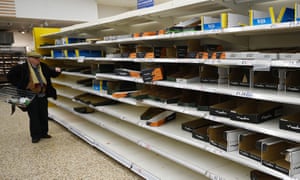Owen Jones
 The British class system is, at its worst, a killer. Men living in the poorest communities in the UK have an average of 9.4 years shorn off their life expectancies compared with those in the richest areas; for women, it’s 7.4 years. If you travel on the Jubilee Line from Westminster to Canning Town, every stop represents a year less in the average lifespan of local citizens. For the poorest women, life expectancy is in reverse.
The British class system is, at its worst, a killer. Men living in the poorest communities in the UK have an average of 9.4 years shorn off their life expectancies compared with those in the richest areas; for women, it’s 7.4 years. If you travel on the Jubilee Line from Westminster to Canning Town, every stop represents a year less in the average lifespan of local citizens. For the poorest women, life expectancy is in reverse.
The coronavirus pandemic is about to collide with this engine of inequality. The super-rich are fleeing on private jets to luxury boltholes in foreign climes, while the well-to-do may deploy their private health insurance to circumvent our already struggling and soon to be overrun National Health Service. Meanwhile, Britain’s army of precarious workers have nowhere to hide, including from employment that puts their health at risk. Uber drivers, Deliveroo riders, cleaners: all in low-paid jobs, often with families to feed. Many will feel they have no choice but to keep working. While many middle-class professionals can protect themselves by working from home, supermarket shelves cannot be stacked remotely, and the same applies from factory workers to cleaners. How many could truly afford to live on £94.25 a week, which is our country’s paltry statutory sick pay?
We know the rich look after their own, but these injustices are not acts of God or mere sad facts of life to be shrugged at with resignation
Those with underlying health conditions are most at risk from coronavirus, and again, the impact differs depending on which rung you’re condemned to on the British social ladder. Previous research by the British Heart Foundation found that working-class Tameside in the north-west has a heart disease mortality rate more than three times higher than well-to-do Kensington and Chelsea. According to Asthma UK: “Asthma is more prevalent within more deprived communities, and those living in more deprived areas of England are more likely to go to hospital for their asthma.” Diabetes is far more common among those living in poverty, and there is a strong link between lung disease and deprivation. 1.9 million pensioners languish below the poverty line: their health will be, on average, worse than their affluent counterparts’, meaning their lives will be significantly more imperilled.
We know that depression and stress weaken our immune systems, and the research is clear: those on low incomes are disproportionately likely to suffer from poor mental health. Poor diet is another factor, and one that is strongly linked to poverty. What, too, of our most impoverished, those who are homeless with poor nutrition, weaker immune systems and a lack of access to good hygiene? And what happens to the 1.5 million children eligible for free school meals if our education sector is temporarily closed? Many could soon find themselves with hungry bellies.
The ‘coronavirus budget’ fails to protect the most vulnerable workers
As the coronavirus continues to unleash mayhem, we could be on the precipice of an economic shock on the scale of the 2008 financial crash. Despite the rhetoric, the latest budget doesn’t reverse the damage to our social fabric inflicted by a decade of austerity. Indeed, the recent budget entrenches cuts in key services outside of the NHS and police. If a renewed economic crisis is on the cards, we can expect the Tories to ensure it is once again paid for by increasingly impoverished children, benefit claimants and a working-age population that has suffered the longest squeeze in real wages for generations.
We know the rich look after their own, but these injustices are not acts of God or mere sad facts of life to be shrugged at with resignation. There will be many terrible lessons to learn from this pandemic: one is a lesson that should have been learned long ago, that inequality kills.
A decade of austerity, and a social order that deprives millions of citizens of a comfortable existence, will mean many more deaths in the coming weeks and months that could have been avoided. The government’s determination to discover a vaccine for coronavirus must be accompanied by a renewed commitment to addressing poverty. Like every crisis, this one is likely to affect working-class and poor people worst. That is not inevitable. It’s a choice – and one within our power to stop, if only we had the will to do so.
• Owen Jones is a Guardian columnist
Since you're here...
… we have a small favour to ask. More people, like you, are reading and supporting the Guardian’s independent, investigative journalism than ever before. And unlike many news organisations, we made the choice to keep our reporting open for all, regardless of where they live or what they can afford to pay.
The Guardian will engage with the most critical issues of our time – from the escalating climate catastrophe to widespread inequality to the influence of big tech on our lives. At a time when factual information is a necessity, we believe that each of us, around the world, deserves access to accurate reporting with integrity at its heart.
Our editorial independence means we set our own agenda and voice our own opinions. Guardian journalism is free from commercial and political bias and not influenced by billionaire owners or shareholders. This means we can give a voice to those less heard, explore where others turn away, and rigorously challenge those in power.
No comments:
Post a Comment